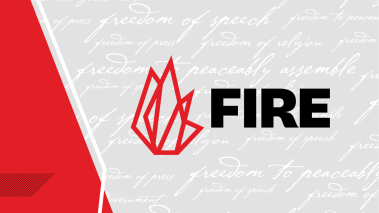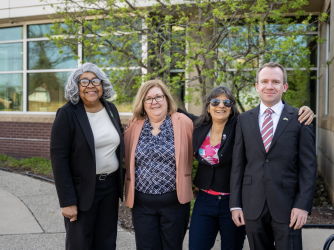Table of Contents
Harvey Silverglate on the Importance of Fighting for Free Speech on Campus

Last night I was deeply honored to accept the Ford Hall Forum's Louis P. and Evelyn Smith First Amendment Award on behalf of FIRE. I was also thrilled to be joined by Harvey Silverglate, civil liberties lawyer and FIRE Co-founder, and Steven Pinker, Harvard professor, bestselling author of The Blank Slate and The Language Instinct as well as a member of FIRE's Board of Advisors. The award, founded in 1981, is bestowed upon "individuals or organizations that demonstrate extraordinary commitment to promoting and facilitating the thoughtful exercise of our right to freedom of expression." Previous recipients have included civil rights activist Rosa Parks, musician and political activist Pete Seeger, and founder of CNN Ted Turner, so, needless to say, I am very proud of FIRE for this recognition.
My speech largely focused on the recent announcement of my new book project, while Pinker's remarks were a fascinating exploration of how the "psychology of taboo" and the urge to censor are related to each other. But because Harvey's speech did such a excellent job of recounting why FIRE was founded in the first place and the continuing importance of defending free speech on campus, I wanted to share the entirety of his speech below:
Thank you all for showing up to celebrate the Ford Hall Forum, its annual Louis P. & Evelyn Smith First Amendment Award, and this year's recipient, The Foundation for Individual Rights in Education, or FIRE. (I have to admit that I've always wanted to shout "fire" in a crowded theater, and at long last I've had that opportunity, for which I thank you – the crowd that showed up in this wonderful crowded theater.) And I thank my dear friend of several decades – Nancy Gertner – for her introduction.
I've been a member of the Forum my entire professional life, and I've come to respect it as one of the rare civil liberties organizations that has meticulously supported free speech in all situations and on all points along the ideological spectrum. For this reason, this award to FIRE has special meaning to me.
When Alan Charles Kors and I co-authored, in 1998, The Shadow University: The Betrayal of Liberty on America's Campuses, we did not have the slightest idea that the book would spawn an organization and, indeed, a movement to restore free speech, free thought and due process to higher education. And when, a year later, we co-founded FIRE–really as a matter of self-defense since we could not field, much less remedy, the huge volume of complaints we began to receive from students and professors who'd read our book–we could not have imagined what that organization would become.
There is, of course, a sad side to FIRE's longevity. When Kors and I co-founded FIRE, I thought that it would be a rather short-lived undertaking: Our message and mission carried such a powerful logic that, surely, it would take only a few short years before we succeeded in our goal of restoring liberty and procedural decency to academia. After all, how could it be that an American college student or teacher could be punished for uttering words and ideas that others–usually administrators, but sometimes other students and teachers–found offensive or inordinately challenging? How long could disciplinary tribunals continue to exist where students have virtually no chance of demonstrating their innocence and that facts are stubborn things and actually matter? How long could our colleges and universities continue to promulgate vague codes and operate kangaroo courts that would make George Orwell and Franz Kafka blush?
The answer, which became clear as we celebrated FIRE's tenth anniversary last year, is that restoring liberty and decency on our campuses is a long haul. I'm hopeful that I will live to see the day when FIRE is no longer needed. I don't know how long this will take, but I do want to report that I'm taking good care of myself in order to improve the odds that I will be here to celebrate FIRE's dissolution. That's one party I'll be sure to attend.
Why is FIRE's mission such an important undertaking?
For one thing, education has its own value. Freedoms of speech, thought, and conscience are their own imperative. Liberty is a transcendent value, and our campuses of higher education have long been deemed centers of learning where free speech and free thought are essential and are to be given special protection. And so liberty on campus is something we should fight for no matter the consequences.
Indeed, without resistance from supporters of liberty, campus administrators can be counted on to move from merely censoring what students may say, to insisting that students adopt and mouth acceptable points-of-view even if the students don't believe what they are saying. Let me tell you one of my favorite stories to emerge from my book tour, more than a decade ago, promoting The Shadow University.
I appeared live on a talk-and-call-in program on Minnesota Public Radio. It was hosted by a locally well-known moderator who expressed considerable skepticism of my book and suggested that the campus horror stories I was telling were gross exaggerations that were giving undue aid and comfort to politically conservative critics of liberal campus administrators. One story in particular engaged the skepticism of the talk-show hostess. I had told of racial sensitivity training sessions at freshmen orientation programs about the country, in which members of the incoming class, during orientation week, were asked to line up according to skin color–with the darkest-skinned African-Americans on one side of the room, and the fairest-skinned blond-haired Caucasians on the other, with every hue in between. Each student was then instructed to explain to his or her newly-introduced classmates how his or her skin color had been, thus far in life, either an advantage or a disadvantage. The political point was that in a racist society, race is destiny. This may or may not be true, of course, but it is a question to be studied and debated, I said, not a required political belief for students to mouth. I suggested that it was the worst possible form of censorship–it was not a mere prohibition against students saying what they believed, but a forced recitation of things that some of the students, at least, did not necessarily believe. Such programs, I said, bridged the gap between mere censorship and full-blown thought-reform.
As the hostess continued to berate me for exaggeration, a listener's call made it through the switchboard, and a freshman at Hamline University in nearby Saint Paul was suddenly on the air. She had just completed freshman orientation week, she reported, and the orientation sensitivity facilitators had the members of the class line up according to sexual orientation: straight students on one side of the room, gay students on the other, bi-sexuals and the confused or uncertain in the middle. The assignment was for each student, including the involuntarily newly outed, to tell his or her classmates how sexual orientation had helped, or hindered, the student's progress thus far in life. According to these diversity facilitators, sexual orientation, more than race, was destiny.
The talk show hostess gasped and dropped the accusation that The Shadow University exaggerated the state of free thought and free speech on campuses.
But there is more to it.
I've recognized for some years now a relationship between, on the one hand, the vague speech codes that can entrap virtually any student who says something found offensive by someone, and, on the other hand, the laws out here in the real world. What began on our campuses has, predictably, infected our entire society. What started in Harvard Yard now is rampant in Harvard Square.
Just last year, I published my second book, entitled Three Felonies a Day: How the Feds Target the Innocent. It is about how the United States Department of Justice uses vaguely written criminal statutes to prosecute virtually whomever it wishes, since the statutes cannot be readily understood by citizens and can be contorted to cover a wide variety of conduct that most of us would consider perfectly legal, even normal and routine. I recognized, to my horror and to my clients' great misfortune, that the federal criminal code was being utilized by overzealous prosecutors much as speech codes were a tool of overbearing campus administrators.
So here is yet another reason to combat the tyranny on our campuses; left to its own devices, the campus culture inevitably will infect the entire society. It's already begun.
There's still a big job to do to restore free speech, academic freedom, and due process to our campuses. This award from the Ford Hall Forum is, for the folks at FIRE, a real shot in the arm. It is of enormous importance as FIRE enters its second decade. I thank the Forum for this honor bestowed upon FIRE, and I'm delighted that we have, in the Forum's judgment, lived up to the high standards of non-sectarian, a-political, viewpoint-neutral, consistent support of free speech, academic freedom, free thought and due process that have likewise characterized America's oldest and most respected free speech forum.
Recent Articles
FIRE’s award-winning Newsdesk covers the free speech news you need to stay informed.

VICTORY: Michigan town declares Sept. 6 ‘First Amendment Day’ after FIRE sues its mayor for shouting down residents

USC canceling valedictorian’s commencement speech looks like calculated censorship

Back into the FIRE: Hasen’s response to FIRE and Rohde: Don’t read the press clause out of the Constitution — First Amendment News 420
